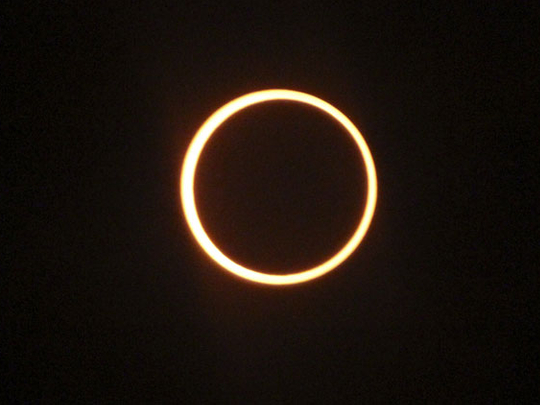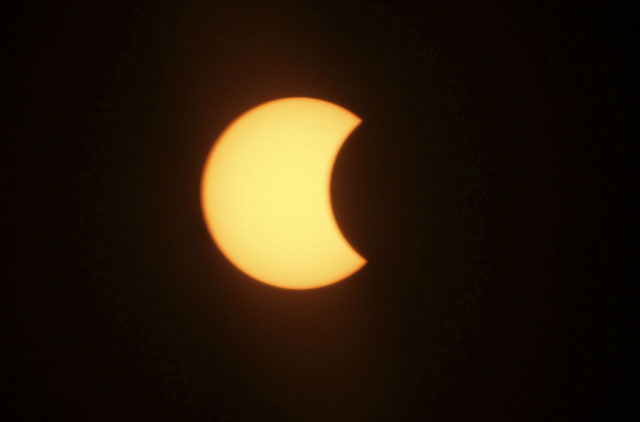
Singapore: The longest, ring-like solar eclipse of the millennium started on Friday, with astronomers saying the Maldives was the best place to view the phenomenon that will not happen again for over 1,000 years.
Thousands of people in cities across southern India have gathered to witness a solar eclipse.
Crowds looked up at the sky Friday, using special protective eyeglasses, as the moon crossed the sun's path, leaving just a narrow, blazing rim of light.
US space agency Nasa said on its website the eclipse was annular, meaning the moon will block most of the sun's middle, but not its edges, causing it to look like a ring.
This blockage will last for 11 minutes, 8 seconds, an annual duration Nasa said would not be exceeded until Dec. 23, 3043.
The "ring" will be seen in a narrow stretch spanning Central Africa, the Maldives, southern India, northern Sri Lanka, parts of Myanmar and China. In Africa, the Middle East and Eastern Europe, it will be a partial eclipse, Nasa said.
Astronomers said Male, the main island of the Indian Ocean island nation the Maldives, will be the best place on land to witness the eclipse as it will last there for over 10 minutes.
In India, the eclipse gave an added auspicious edge to the Kumbh Mela festival where thousands of people immerse themselves in the Ganges river, an act believed to purge all sins.
"Today is a combination of a moonless night and a solar eclipse that (is also happening) during the time of Kumbh Mela. It is a very rare phenomena," Baba Ram Vilas, a Hindu monk in saffron robes, told reporters on the banks of the Ganges river, where the Kumbh Mela is held every 12 years in a different city.
"Taking a holy dip during the solar eclipse is a very pious act. It is very auspicious, it is very fruitful and it can get one salvation," Hindu priest Babu Ram Sashtri added in Haridwar.
Astronomers said the eclipse started at 0514 GMT in the Central Africa Republic, peaking at around 0700 GMT and ending completely at 1007 GMT.
"Many amateur astronomers have taken time off work and spent a lot on money on travel to see it," said Lin Qing, head of the Sheshan Station of Shanghai Astronomical Observatory, Chinese Academy of Sciences, told China's official Xinhua news agency.
"We will travel across China simply to witness the magnificent astronomical phenomena," Lin said.
According to astronomical websites, the last annular eclipse occurred roughly 1 year ago, January 26, 2009. The next one will happen May 20, 2012.














